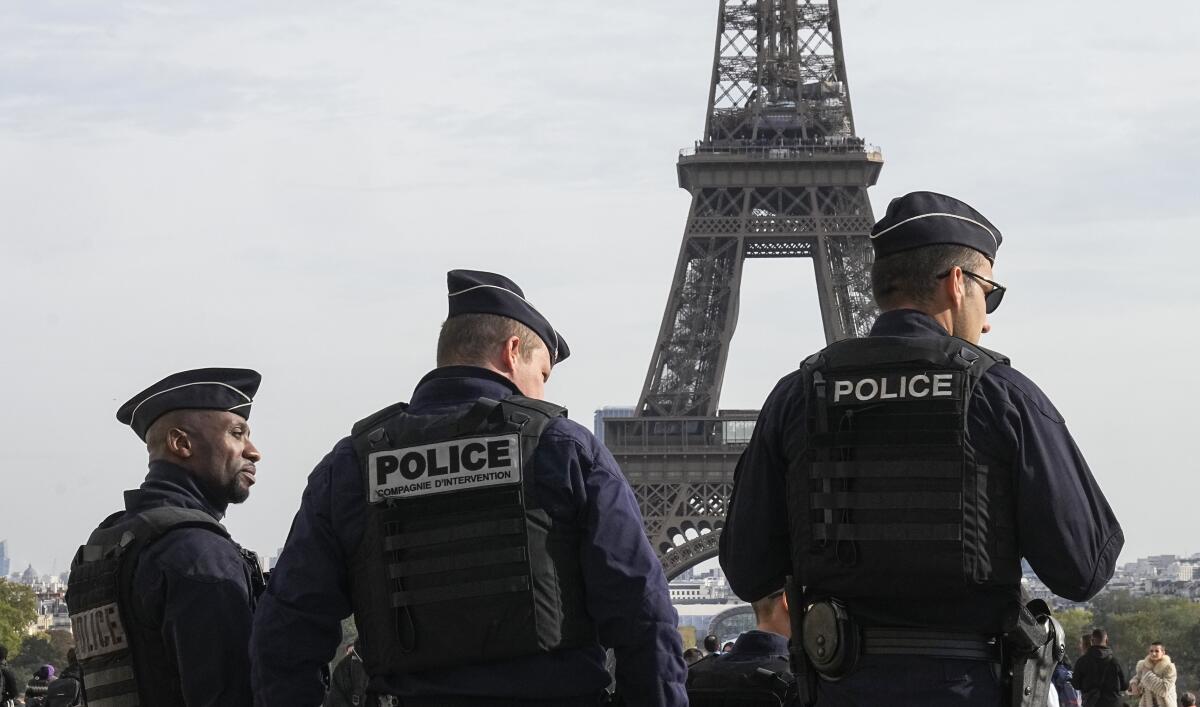LAPD officers allowed to carry guns at Paris Olympics after France makes exception

- Share via
Eager to ramp up security preparations for the 2028 Summer Olympics, the Los Angeles Police Department is sending a small cadre of officers to Paris for this year’s Games.
And — in a bit of a geopolitical flex — the LAPD had a hand in convincing the French government to temporarily suspend its law against overseas police officers being armed in the country.
Thirty-two LAPD reserve officers and a supervisor will travel overseas next week as part of the Olympic delegation to work at event sites across the country, under the supervision of the French national police and the Gendarmerie, according to law enforcement documents reviewed by The Times. France will cover the officers’ airfare and lodging expenses, but not meals, the documents say.
The reserves have gone through the Police Academy just like regular officers, and can “perform the same functions as regular, full-time officers,” the LAPD says on its website. Three teams of reserves will remain in France at varying times during the Games, working 8- to 12- hour shifts, five days a week.
The visiting officers won’t wear body cameras, according to documents outlining plans for the trip. And although they will be in full uniform and armed with their service weapons, their duties will be largely ceremonial — more to provide a visible presence than make arrests or assist with crowd control.
Additionally, the delegation of officers will provide extra protection during the expected visits of L.A. political leaders including Mayor Karen Bass at the Games.
The L.A. County Sheriff’s Department is sending its own delegation, records show.
Foreign police and military personnel from non-European Union member nations are typically forbidden from being armed and acting in their law enforcement capacity on French soil. But former LAPD Chief Michel Moore and other police administrators helped talk the government into temporarily relaxing its rules in order to allow U.S. officers to carry their service weapons. The LAPD said the effort had been in the works since a 2021 visit to France by Moore.
Moore’s trip was one of several to France by department officials in recent years. The visit caused a stir after two members of the then-chief’s security detail detained a French citizen who had been wrongly accused of stealing the cellphone of a senior LAPD official’s wife in Marseille.
Moore later apologized to Marseille officials and the U.S. consul general during a previously scheduled Olympics planning meeting, and told them he had initiated an internal investigation into the matter, the LAPD said.
As part of L.A.’s preparation for 2028, some of the city’s Olympic subcommittees started meeting or will do so in the coming weeks. Interim Chief Dominic Choi said that despite the ongoing struggles in hiring and retaining officers, he is confident that the department will be ready by the time the Games roll around in four years.
“We coordinate so well with our mutual aid agencies, I’m not concerned about having enough resources,” he said.
L.A. is about to get a new police chief. Here is an inside look into how this crucial position is being filled.
The LAPD is hardly the only U.S. policing agency scheduled to work the Games.
At a briefing late last month, Paris Police Chief Laurent Nunez announced plans to deploy about 30,000 police officers each day, including armed police, with a peak of 45,000 for the opening ceremony on the Seine, which will involve boats and huge crowds watching from the embankments.
Scores of officers will come from departments from other countries, supplemented by about 25,000 private security guards, according to Nunez.
Adding to the challenge for Paris officials is that some events will be held in historic landmarks, such as the Grand Palais, that weren’t designed for such sporting events — and the crowds they bring.
Organizers expect as many as 15 million visitors for the July 26 to Aug. 11 Games and Paralympics that follow.
Cybersecurity will also be a major point of emphasis for French authorities.
Pointing to the heavy police presence at past Games, including the last time L.A. hosted the event in 1984, grassroots advocacy groups such as NOlympics LA caution that such events are used as an excuse to target and harass people of color and the unhoused. They also fear the further expansion of police powers, particularly with the advent of increasingly invasive technology.
Chris Burbank, a former police chief in Salt Lake City, said he saw firsthand how important it is to strike a balance between privacy and security earlier in his career when that city hosted the Olympics in 2002.
After 9/11, he said, there was heightened scrutiny of the Muslim community that in hindsight was not justified.
“There is no question in my mind that people were inappropriately targeted in that time,” said Burbank, who is now with the Center for Policing Equity. “Gas stations that were owned by people who were sending money back to family in the Middle East,” for instance.
Like other host cities before it, Burbank said, L.A. will work closely with the Olympic Committee, as well as local, state and federal law enforcement partners for the Games.
“We created, in essence, the largest law enforcement agency in the state of Utah in history,” he said.
The Associated Press contributed to this report.
More to Read
Sign up for Essential California
The most important California stories and recommendations in your inbox every morning.
You may occasionally receive promotional content from the Los Angeles Times.












